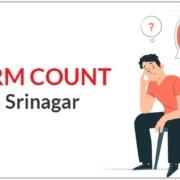Top 10 Reasons for Failed IVF Treatment
IVF Failure:- Starting an In Vitro Fertilization (IVF) journey is a very personal and frequently emotional undertaking. IVF offers a glimmer of hope for couples who are struggling with infertility in their quest for parenthood. But the road is not always easy, and it takes an unfathomable amount of perseverance to ride out the storms of failed attempts. We examine the intricacies of in vitro fertilization in this investigation, illuminating the various factors that lead to the procedure’s sporadic failures.
Reasons for IVF Failure
You may learn more about the main causes of IVF failure from this article:

1 Failure of Embryo Implantation
Embryo failure to implant into the uterine lining is one of the main causes of IVF failure. The precise causes of the failed attempt are yet unknown to the doctors. There are two possible causes for the attempt to fail: either an embryonic issue or an issue with the uterus. Finding the precise source of the issue is still challenging.
Embryos have no chance of surviving for more than five days. In the field of IVF, the cause of weak and unhealthy embryos is still unknown and is referred to as a “black box” question. The lady can choose to undergo PGS testing in conjunction with IVF, which can assist infertility experts in choosing healthy embryos for implantation and increase the likelihood of successful embryo implantation.
2. Egg Quality
For women under 35, the success rate for embryo implantation is 50%, but for those over 40, it is just 12%. It makes sense to go with IVF using donor eggs if the lady has a healthy uterus but her female egg quality is low. If the primary cause of an IVF failure is poor egg quality, then transferring the eggs to a surrogate will likewise fail. Reproductive difficulties in older women are primarily caused by poor-quality eggs rather than problems with the uterus.
3. Age Is Important
The biological clock, a constant factor in fertility, determines how well IVF treatment works out. The success of IVF procedures is significantly influenced by the ages of both partners. Growing older presents women with a variety of difficulties, such as decreased egg quality and a reduction in ovarian reserve. Just as the number of candles on a birthday cake rises, so too does the difficulty of getting pregnant with IVF.
Fertility is a dynamic variable rather than a timeless constant in biological reality. Age reduces both the quantity and quality of eggs, which impacts the likelihood of successful fertilization and implantation. Age-related infertility is still a major obstacle for couples, necessitating a complex dance between biology and time, even with advances in reproductive technologies.
4. Reduced Ovarian Reserves
Ovarian reserve is a key component in the complex dance of in vitro fertilization. The amount and calibre of a woman’s eggs are referred to as her ovarian reserve, and they play a crucial role in the outcome of in vitro fertilization. The quantity and quality of eggs available for fertilization decrease as women age due to ovarian reserve reduction.
Early detection and treatment of reduced ovarian reserve during the IVF process is a hurdle. Fertility doctors can adjust treatment strategies based on the assessment of ovarian reserve made possible by advanced diagnostic techniques including blood tests and antral follicle counts. Aggressive ovarian stimulation is one strategy that can be used to increase the likelihood of obtaining viable eggs.
5. Imbalances in Hormones
Any mistake in the intricate dance of hormones might have a cascading effect on the IVF procedure. Reaching a hormonal balance is not only necessary but also a delicate dance that must be coordinated with the cycle of reproductive therapies. The delicate balance between the hypothalamus, pituitary gland, and ovaries can be upset by hormonal abnormalities, affecting the outcome of in vitro fertilization (IVF) cycles.
Hormonal imbalances can be exacerbated by disorders like irregular menstrual cycles or polycystic ovarian syndrome (PCOS). Gonadotropins and gonadotropin-releasing hormone (GnRH) analogues are among the drugs that must be carefully administered to control hormonal fluctuations and improve the environment for egg maturation and retrieval.

6. Aberrant sperm and poor-quality sperm
Sperm plays a role in the health of the developing embryo. Men with severe male factors, such as diabetes and azoospermia from genetic causes, may have low sperm quality and quantity.
The amount and quality of sperm can be impacted by chromosomal abnormalities. Hence, the embryo becomes aberrant both during and after fertilization.
It may have two or three times as many chromosomes as it does or fewer. Breaks in the sperm head’s DNA can result in DNA fragmentation, which can ultimately lead to unsuccessful implantation and miscarriage.
7 . The Ovarian Reaction
To enhance egg production, follicle-stimulating hormone (FSH), a fertility hormone, must be injected daily into the female during the initial stages of IVF treatment. Some women’s ovaries react incorrectly to this medicine, which prevents them from producing enough eggs for harvest. Because of their already lowered egg production, elderly women are particularly affected by this.
The IVF procedure doesn’t have to cease if there is a poor ovarian response. Changes to medicine and investigations might be able to improve the situation. The ovarian reserve is measured by a blood test for the Anti-Mullarian Hormone (AMH) and an ultrasound scan looking at the antral follicle count. The optimal hormonal regimen and dosage to stimulate your ovaries and generate a sufficient number of eggs would depend on your ovarian reserve.
8. Molecular Biology
Each spouse’s biological characteristics may have an impact on the health of the embryo. Chromosomal issues can be caused by genetic disorders that may impact the sperm or the egg, making it difficult for an embryo to take root or boosting the possibility of miscarriage. Genetic testing is one method that can be used to identify these defects in embryos before they are transplanted. The possibility of selecting healthy eggs can be increased by genetic testing such as PGT, which is especially important if there is a sign of genetic problems or repeated losses.
9. Failure of Implantation
Sometimes the embryo may not attach itself to the uterine lining sufficiently. Issues with the embryo or the uterine environment could bring this on. The uterine lining, or endometrium, needs to be appropriately prepared to receive the embryo. Inadequate endometrial thickness, hormonal abnormalities, or certain immunological conditions are among the causes of implant failure. To address these issues and raise the chance of successful implantation, hormonal treatments and techniques such as IUI (intrauterine insemination) may be used.
10. Endometriosis
Tissue that resembles the lining of the uterus develops out of the uterus in this condition. Given that it may result in oedema and scarring, it might affect the efficacy of IVF and conception. Patients with endometriosis may have lower-quality eggs, a decreased ovarian reserve, and a higher risk of unsuccessful implantation. For certain individuals, endometriotic tissue removal via laparoscopy surgery may be beneficial.
How to Identify IVF Failure Symptoms
Even though the emotional toll of an unsuccessful IVF cycle can be severe, being aware of the symptoms and possible causes can help you make proactive decisions. Unusual bleeding, pelvic pain, or abrupt mood swings are symptoms that should drive you to see a reproductive doctor right away.
Periods Following a Failed IVF Cycle
Going through a phase following unsuccessful IVF treatments can be emotionally taxing. It signals the end of an optimistic wait and frequently necessitates helping couples deal with disappointment. Planning the next steps and getting through this stage can be made easier by seeking open communication, emotional support, and advice from fertility specialists.
Managing IVF Failure
It can be depressing to experience the signs of IVF failure or to have an IVF cycle fail, but you must keep in mind that this does not mean the end of your journey to motherhood. After one or more failed efforts, many couples find success. During this phase, it’s important to have coping techniques, emotional support, and open communication with your healthcare team. Hope never wavers for couples who experience an unsuccessful IVF cycle.
A comprehensive assessment of the IVF cycle will result from speaking with your fertility doctor, making it possible to pinpoint the precise elements that contributed to the cycle’s failure. With this knowledge, a customized strategy can be created for your next tries, raising the likelihood of a favourable result.
In Summary for IVF Failure
IVF is a multifaceted, intricate process that depends on a wide range of variables to be successful. Couples and individuals can work together with their fertility doctors to address any potential concerns by being aware of the common reasons why IVF fails. Better results can be achieved by maintaining a healthy lifestyle, following prescription instructions, and getting emotional support, even though not all elements are under your control. Every fertility journey is different, and it’s critical to keep in mind that an IVF failure does not automatically rule out becoming a parent. For more information visit our blogs or consult our IVF specialist at Imprimis IVF & Fertility Centre in Srinagar.










